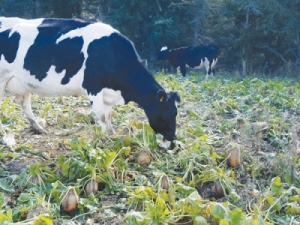Turning data into dollars
If growing more feed at home adds up to $428 profit per tonne of dry matter to your bottom line, wouldn’t it be good to have a ryegrass that gets you there quicker?
 Fodder beet, a popular feed for cows, can contribute to copper deficiencies, and increase the risk of phosphorus deficiency.
Fodder beet, a popular feed for cows, can contribute to copper deficiencies, and increase the risk of phosphorus deficiency.
An inexpensive autumn feed test can guard against mineral deficiencies in dairy and beef cows that can lead to low growth rates and poor milk yields.
This is the message from consultant nutritionist to SealesWinslow, Paul Sharp.
Winter feeds like fodder beet, low pasture phosphorus levels in some regions and lower seasonal availability of copper can cause animals to be deficient in both these key minerals during late pregnancy, early lactation and calf growth, Sharp says.
For about $100 a comprehensive pasture mineral test will tell farmers what they need to know about these key matters. They can then get animal nutritionists or vets to determine what supplementation their stock need.
Liver biopsies from culled cows are also a useful indicator of animal reserves of key trace elements such as copper intake, and while blood tests can monitor trends, these are not as good at predicting animal stores.
"Copper availability to the animal is lower over winter and we often have low copper concentrations in pasture," Sharp says. "Availability is further compromised by other minerals that could be in the animals' diet – such as high iron content when grazing crops, high molybdenum levels in some soils, sulphur and zinc.
"These make the copper unavailable for absorption in the diet. Copper deficiency is most likely to occur in winter and early spring and it has impacts on conception and growth rates, and can even cause bone fractures in calves and osteoporosis in cows."
Sharp says zinc treatment for facial eczema can deplete copper reserves because zinc can lock out copper competing for absorption in the digestive tract. Fodder beet can also contribute to copper deficiencies, and increase the risk of phosphorus deficiency. Lactating cows need 3-4g of phosphorus/kgDM, and copper requirements are about 150mg/day for weaner calves and up to 450mg/day for cows.
Although phosphorus fertilisers are used to boost pasture growth, SealesWinslow says it has seen during the past year that phosphorus deficits in pasture appear to be increasing, particularly in the South Island, possibly due to changes in pasture cultivars and grazing management, although the cause isn't fully clear.
"The trouble with deficiencies of nutrients like phosphorus is that they can be hard to detect. If cows don't get enough phosphorus, they start to mobilise their reserves and can end up developing sub-clinical symptoms, including reduced appetite and rapid weight loss. This can lead to a reduction in milk yield in dairy cows. Some cows will recover from phosphorus deficiency, but others will go down; this is when you see creeper cows."
The risk of phosphorus, magnesium or trace element deficiency causing animal health issues can be reduced with supplements, including SealesWinslow's molasses block range, the company says. This includes a Fodder Beet Block, which helps to fill the nutritional gaps of the crop. Low copper levels can also be addressed by molasses blocks, feed additives or by dosing drinking water.
Two farmers and two farming companies were recently convicted and fined a total of $108,000 for environmental offending.
According to Ravensdown's most recent Market Outlook report, a combination of geopolitical movements and volatile market responses are impacting the global fertiliser landscape.
Environment Canterbury, alongside industry partners and a group of farmers, is encouraging farmers to consider composting as an environmentally friendly alternative to offal pits.
A New Zealand dairy industry leader believes the free trade deal announced with India delivers wins for the sector.
The Coalition Government will need the support of at least one opposition party to ratify the free trade deal with India.
Primary sector leaders have welcomed the announcement of a Free Trade Agreement between India and New Zealand.
President Donald Trump’s decision to impose tariffs on imports into the US is doing good things for global trade, according…
Seen a giant cheese roll rolling along Southland’s roads?